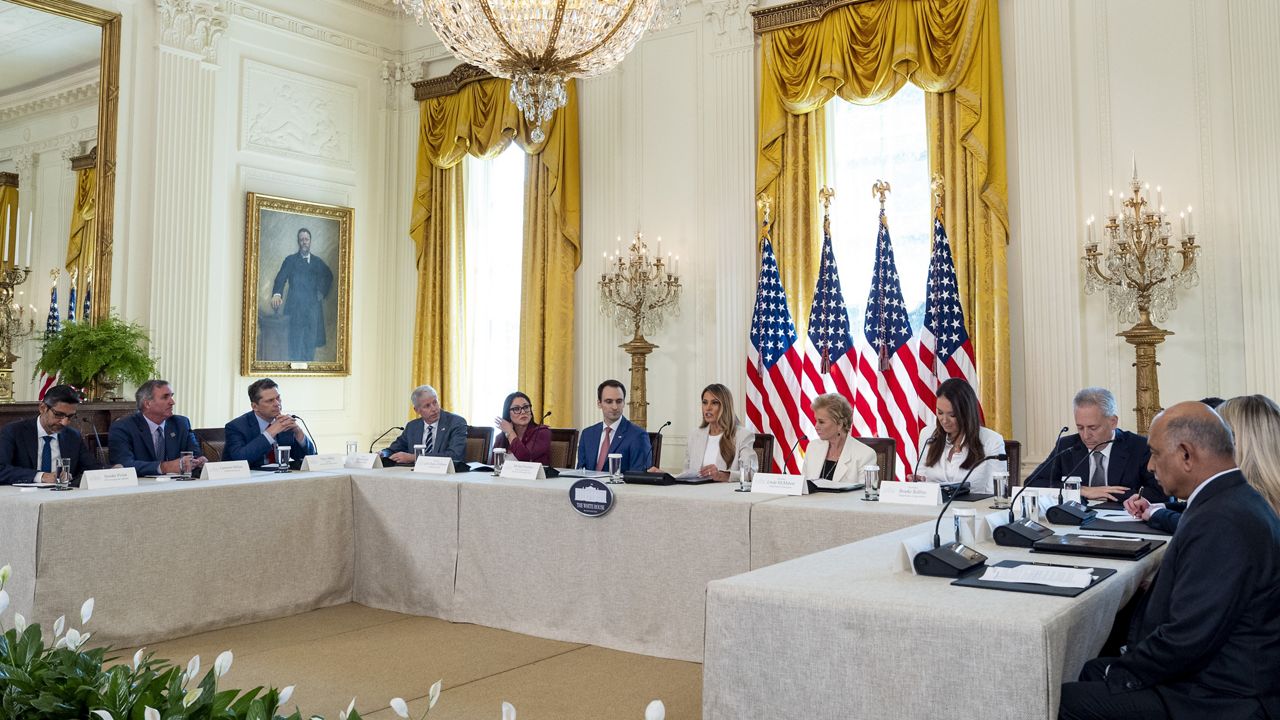WASHINGTON — First lady Melania Trump declared “the robots are here” as she urged a deliberate but careful embrace of artificial intelligence during a convening Thursday of a White House task force on AI in education.
“I predict AI will represent the single largest growth category in our nation during this administration, and I won’t be surprised if AI becomes known as the greatest engine of progress in the history of the United States of America,” Trump said. “But, as leaders and parents, we must manage AI’s growth responsibly.”
The first lady was joined on stage for the roundtable-style event by members of the task force, which includes several of President Donald Trump’s Cabinet secretaries, as well as major names in the technology sector, such as Google CEO Sundar Pichai. Dozens of other Big Tech and private sector leaders, including OpenAI CEO Sam Altman, were present in the East Room for the event, where they were lauded by White House Office of Science and Technology Policy Director Michael Kratsios for their “generous pledges.”
The meeting was meant to shine a light on what the White House says is more than 135 commitments from leaders in the field to support education in artificial intelligence across the country.
Arvind Krishna, the CEO of IBM, for instance, noted in his remarks to the room that the technology company he leads is signing on to train 2 million American workers in “cutting-edge AI skills” over the next three years through a newly launched program.
Pichai, meanwhile, announced that of the $1 billion the company recently committed for education and job training programs, $150 million would specifically go toward AI-focused grants.
“This is all in the service of helping the next generation to solve problems, fuel innovation and build an incredible future,” he said. “These are all goals we all share. We are incredibly thankful for the partnership and the leadership from the first lady, the president and the administration and for showing us the way.”
It was the second meeting of the task force since the president created it via an executive order in April meant to boost AI literacy and proficiency in America by better incorporating it into education. The event marked the first since the Melania Trump announced a nationwide competition challenging students in grades K-12 to use artificial intelligence to address a community issue, which will conclude with an event at the White House with the winners.
“We must ensure America’s talent, our workforce, is prepared to sustain AI’s progress, and the Presidential AI Challenge is our first major step to galvanize America’s parents, educators, and students with this mission,” the first lady said at the task force meeting.
She added that AI will “serve as the underpinning of every business sector in our nation.”
Several of the president’s Cabinet secretaries who sit on the task force, including Education Secretary Linda McMahon, Agriculture Secretary Brooke Rollins and Energy Secretary Chris Wright, gave updates on how they are utilizing the technology in their work and seeking to ensure Americans are educated in how to use it in the fields related to their departments.
McMahon, for instance, pointed to a recent letter to those receiving grants from the Education Department letting them know that AI tools and technologies are an “allowable use” of federal funds in a bid, she said, to empower schools to explore how to best integrate the technology in teaching. Wright used his remarks to warn that the U.S. “will not win at AI if we don’t massively grow our electricity production.”
The president’s AI and crypto czar David Sacks, meanwhile, highlighted Trump’s other executive orders related to AI, including one seeking to make it easier to build new data centers and energy infrastructure.
“Some people think that AI is going to take all of our jobs,” Sacks said. “I really don’t think that’s going to happen.”
Instead, he argued AI would unleash a “boom like we’ve never seen.”
The first lady, who has not frequently taken the spotlight and participated in selective events since her husband’s return to the Oval Office, has touched what she sees as both the positives and negatives of the rapidly developing technology. The White House has highlighted how she utilized AI for the narration of the audio version of her 2024 memoir “Melania.” At the same time, the first lady actively supported and pushed for a bill — ultimately passed by Congress and signed by the president — imposing harsher penalties for the spread of non-consensual sexual images, including those created using artificial intelligence.
